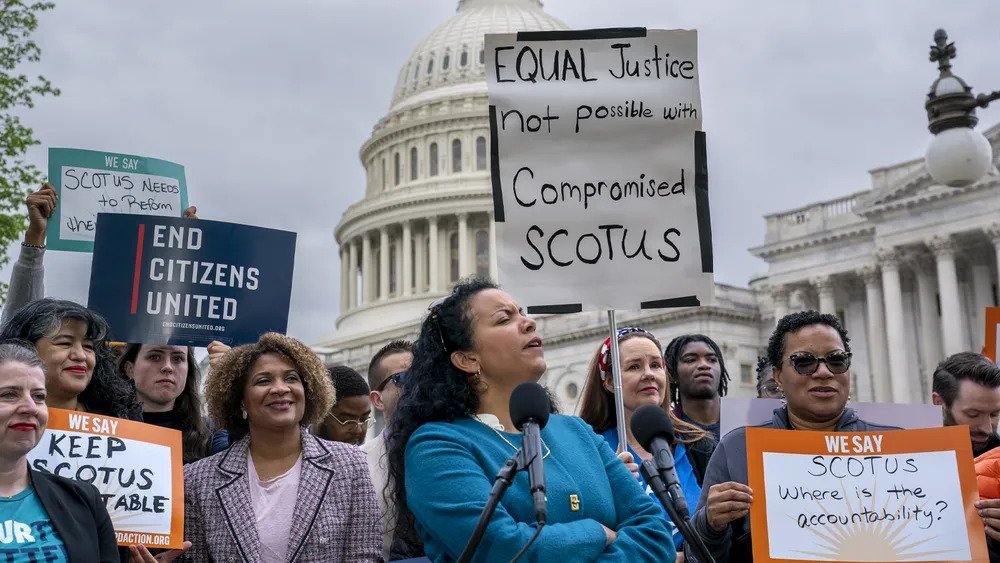Here’s The Real Goal Of Supreme Court Corruption



Activists call for Supreme Court ethics reform at the Capitol on Tuesday, May 2, 2023. (AP Photo/J. Scott Applewhite)
The prospect of luxury gifts and outside cash is designed to halt the historical trend of GOP appointees becoming more liberal.
by David Sirota & Andrew Perez
Amid all the revelations of corruption at the Supreme Court, one glib social-media defense of the conservative justices has been about ideology. As the (ridiculous) argument goes, these scandals aren’t actually scandals because the gifts and cash that flowed from right-wing billionaires and conservative activist Leonard Leo’s dark money network don’t actually influence the justices. Why? Because the justices were already conservative and were always going to vote the way they voted on cases of interest to their paymasters.
But that analysis misses how corruption works on a systemic level.
As the Founders noted, judges are given lifetime appointments for the explicit purpose of preserving an “independent spirit” that allows them to change their views without fear of consequences. And in fact, data suggests that in the past, many conservative justices have become more liberal as they age.
In light of that, the money and gifts flowing to conservative justices can be seen not merely as cheap influence-peddling schemes to secure specific rulings in individual cases. It can also be seen as a grand plan to deter the ideological freedom that lifetime appointments afford.
In short, the largesse from billionaires and Leo — who helped assemble the Supreme Court’s 6-3 conservative supermajority as President Donald Trump’s judicial adviser — creates personal financial incentives for justices to remain doctrinaire ideologues and resist any deviation from the conservative line, even if they might once in a while have an inkling to dissent.
No doubt, preventing this so-called “ideological drift” is exactly the point, as Five To Four’s Michael Liroff noted in a recent episode of Lever Live. From Earl Warren to William Brennan to John Paul Stevens to David Souter, the Republican Supreme Court appointees who ended up becoming liberals haunt the psyche of the right’s judicial activists. It is this dynamic that conservative puppet masters most want to prevent, because it has not been an anomaly.
In 2015, FiveThirtyEight parsed the data and quantified a big trend in its headline: “Supreme Court Justices Get More Liberal As They Get Older.”
As you can see in the chart documenting the trend over nearly a century, many Republican nominees given the political freedom of a lifetime appointment have become more liberal in their rulings as they age.
To try to break this trend, conservative operatives didn’t necessarily conjure more compelling jurisprudential arguments in service of their ideology. Instead, they built a corruption machine that creates personal financial incentives for Republican appointees to never deviate from whatever that machine wants in any given case. To make conservatives’ demands extremely clear, that machine files endless amicus briefs, or friend-of-the court filings, at the Supreme Court and throughout the federal judiciary.
The financial incentives are elucidated in the recent spate of scandals at the high court. Indeed, each member of the conservative Supreme Court majority — and all lower court judges aspiring to be the next GOP Supreme Court appointee — knows that if he or she toes the line, there may be big rewards, whether it’s luxury vacations, boarding school tuition and housing for family members, land deals, or lucrative payments to spouses.
The justices also stand to have law schools named for them or make extra cash on the side teaching at those law schools.
The Antonin Scalia Law School at George Mason University, renamed as part of a dark money deal brokered by Leo, has paid at least three Supreme Court justices to teach classes in recent years. In some cases, those classes have resembled all-expenses-paid international vacations — which also happen to come with paychecks approaching $30,000.

